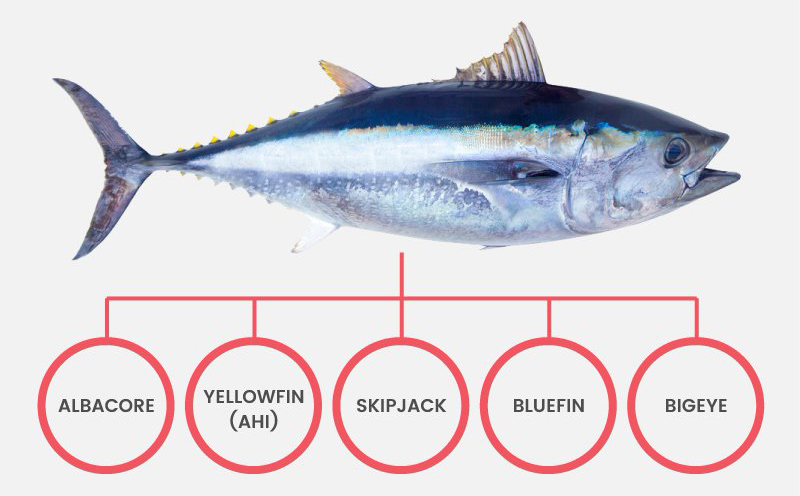Amazing Benefits Of Tuna Fish
[ 2018.06.22 ]
Tuna fish is low in calories and packs a good amount of protein and heart-healthy omega-3 fatty acids into each serving. It’s also loaded with antioxidants and important micronutrients, giving you all the more reason to make tuna fish a regular part of your diet.

What Is Tuna Fish? Types of Tuna
A tuna is a type of saltwater fish that belongs to the same family as mackerel fish and bonito fish. Tuna fish is a very diverse saltwater fish that belongs to the Scombridae family, commonly called the mackerel group. However, tuna belongs to a tribe, called Thunnini, which includes 15 different tuna species.
The most common types of tuna include:
Albacore tuna
Yellowfin (ahi) tuna
Skipjack tuna
Bluefin tuna
Bigeye tuna

The tuna fish size can vary pretty widely between different species; the yellowfin tuna, for example, can be under three pounds while larger varieties like the northern bluefin tuna might weigh up to 1,430 pounds.
Tuna fish of varying species are found in all of the world oceans, and while different cultures enjoy different varieties, the health benefits are largely the same. Their delicious taste, global availability, and healthy components make them an ideal replacement for red meat or for those who like to add some healthy fish variety to their diets.
Nutritional Value Of Tuna Fish
The health benefits of tuna fish can be attributed to the impressive content of vitamins, minerals, and organic compounds found in this delicious fish. These include antioxidants and protein, without much-saturated fat or sodium. It also has impressive levels of selenium, phosphorous, iron, magnesium, and potassium. In terms of vitamins, there is a wealth of vitamin B12 and niacin, as well as a good amount of vitamin B6 and riboflavin.
Health Benefits Of Tuna Fish
Now, let’s explore more of the health benefits of tuna fish that these components confer.
Heart Health
Perhaps the most common health benefit that is attributed to tuna fish is its significant impact on heart health. In terms of reducing coronary heart diseases, tuna fish has high levels of omega-3 fatty acids, which help reduce omega-6 fatty acids and LDL or bad cholesterol in the arteries and blood vessels. Furthermore, it often replaces foods with high saturated fat content, further lowering the risk of heart diseases.
Blood Pressure
The anti-inflammatory omega-3 fatty acids can help reduce blood pressure. Potassium, found in tuna, is a vasodilator and is very good for lowering blood pressure. Reducing hypertension can significantly boost your health by lowering the strain on your cardiovascular system. This will help prevent heart attacks and strokes, as well as conditions like atherosclerosis.
Eye Care
Tuna fish, being rich in omega-3 fatty acids, is a great option for preventing eye disorders like age-related macular degeneration. This disease is the major reason behind the occurrence of blindness in the elderly people. The blindness is also caused due to diabetic complications and tuna can help in reducing the chances of diabetic retinopathy.
Growth and Development
Tuna fish is packed with high levels of protein. A single serving of only 165 grams (approximately 1 can of tuna fish) contains more than 80% of your daily protein requirement. Proteins are the building blocks of our body that guarantee growth, faster recovery from wounds and illnesses, improved muscle tone, and overall metabolic efficiency.
Weight Loss
Tuna fish is low in calories and fat, yet loaded with beneficial nutrients like protein. The omega-3 fatty acids found in tuna stimulate a hormone called leptin, which balances the body’s food intake with the internal desire to eat more. This can reduce overeating and make sure that your body is only consuming what it actually needs.
Boosted Immune System
Tuna contains a good amount of vitamin C, zinc, and manganese, all of which are considered antioxidant in nature. Antioxidants are one of the body’s defense mechanisms against free radicals, the harmful by-products of cellular metabolism that cause cancer and other chronic diseases. However, the real champion of tuna’s immune system-boosting potential is selenium. Tuna fish is rich in this mineral, giving nearly 200% of the daily requirement in a single serving. This makes the fish a very powerful antioxidant and immune-boosting food.
Energy Levels
The B complex vitamins in tuna have been connected with a wide range of health aspects. They are mainly involved in boosting the metabolism, increasing the efficiency of organs, protecting the skin, and increasing energy levels. By consuming tuna fish regularly, you can ensure that you are active, energetic, and healthy.
Blood Circulation
Tuna is a rich source of iron, along with the B-complex vitamins that play an important role in red blood cell formation. Without iron, people become anemic and their blood is unable to oxygenate the vital organs that need fresh oxygen to function efficiently.
Cancer Prevention
Tuna fish has antioxidant properties, thanks to selenium and other nutrients, making it effective at preventing some types of cancer. Numerous studies have connected tuna to a reduction in the occurrence of breast and kidney cancer. Selenium is a powerful antioxidant that neutralizes free radicals before they can cause a mutation in healthy cells, thereby turning them into cancer cells. Other promising results have also shown a reduction in colon cancer, thanks to the high levels of omega-3 fatty acid in the fish.
Kidney Diseases
The potassium and sodium content in tuna is well-balanced, which helps manage the fluid balance in the body. When your body maintains a fluid balance, the kidneys function properly, thereby lowering the chances of developing serious kidney conditions.
Reduced Inflammation
Tuna fish can keep the body’s overall stress levels down by reducing inflammation, thanks to the anti-inflammatory vitamins and minerals. A reduction in inflammation across the body ensures an enhanced functioning of all organs. It also helps prevent inflammatory diseases like arthritis and gout, both of which afflict millions of people around the world.
Cell Membrane Damage
When tuna fish is cooked, the proteins in tuna begin to break down into fragments, called peptides. These fragments can actually be powerful antioxidants that specifically target cell membranes , keeping them healthy, strong, and functioning properly. Free radicals often attack membranes throughout the body, including those in the brain, so eating cooked tuna and improving the membrane protection is a very good idea!
Tips for Enjoying Tuna Fish
The taste of tuna fish makes it perfect for eating as a tuna steak, as a spread with mayonnaise on crackers or bread, in tuna salad and burger, or any of the other varieties. It is versatile, delicious, inexpensive, and very good for health.



